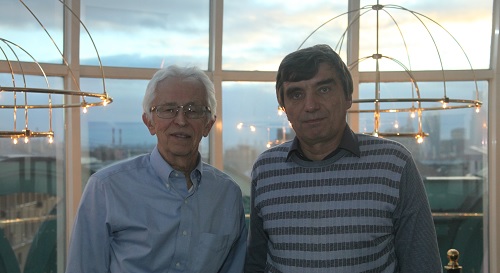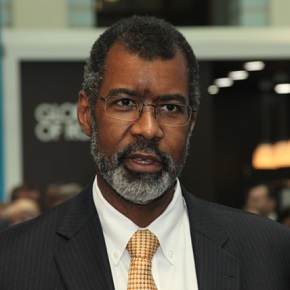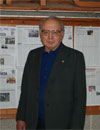 |
||
|
Siegfried Hecker: we are doomed to cooperate AtomInfo.Ru, PUBLISHED 19.11.2017 Siegfried Hecker, (c) AtomInfo.Ru  Dr. Hecker, what is your idea about possible cooperation between Russian and U.S. scientists in the nuclear field? When I look at the past, I've always thought that cooperation was extremely important.My feeling is that we did a lot of good; there were a lot of benefits to both countries. It's often not appreciated that it was actually beneficial to both countries. Itis unfortunate that it came pretty much to an end between U.S. and Russia. And I also believe very strongly that we are not finished. There are still certain issuesin the nuclear arena that are of common interest. The way that I look at it, we have to cooperate to get the best from nuclear technologies. That would mean nuclear energy, future of nuclear power, and nuclear medicine, all of those things where nuclear does a lot of good, and we're not done. The other is how to prevent the bad things from happening in the nuclear arena. That means the issue of nuclear materials security and safeguarding. The whole issue of proliferation is that it's not in our interest, either Russian interest or American interest, to have additional countries acquire nuclear weapons. Of course, a good example right now is North Korea. There's not much cooperation between U.S. and Russia on North Korea. The other example is Iran, where for a couple of years there was very good cooperation between U.S. and Russia. So, that is the sort of cooperation that needs to continue. And, in particular, when it comes to issues of nuclear terrorism, that, I think, is crucial - it's again in both of our interests that nuclear terrorists are not able to acquire a nuclear weapon, nuclear materials, radiological materials for what we call a dirty bomb and that they are not able to use those. The two countries in the world that have the most nuclear knowledge are Russia and the U.S. So, it's just natural that they should work together because it's in their common interest to do so. Over the last twenty five years, the two countries have cooperatedin all those areas that I mentioned. And now they let that go. The way that I look at it is that Washington and Moscow are in essence holding nuclear cooperation hostage to their political differences; and it will hurt both of them if they stop cooperation. One of the areas for Russian-American nuclear cooperation could be joint work in third countries. For example, on the African continent where things are not so good in terms of security of nuclear materials. What do you think about it? Before I answer that, let me say that I think we aren't finished in bilateral, that is, even for each other. In nuclear material security,what we call MPC&A (Materials Protection, Control and Accounting), I don't think we've finished in that either, because in that area you're never finished, you can never relax, you never think that now you have everything taken care of. The people who would like to steal the material always have ways or will figure out new ways to do this; andwe develop vulnerabilities. For example, in today's world, because of cyber, everything is digital, which helps you in the accounting, but also makes you more vulnerable. The U.S. and Russia have made a lot of progress in nuclear materials security but we must never stop.We must continue to work together, compare best practices and lessons learned, again lessons learned from how the bad people figure out how to develop new ways to get the nuclear materials. I know that has certain sensitivities and especially that seems to be the case on the Russian side. Russia after a while felt that it was not appropriate for Americans to go into the Russian facilities, that somehow they would become more vulnerable. I don't believe that. We had Russians visiting lots of American facilities. We learn from each other when we see each other's facilities. If the politicians say: "Our nuclear materials are 100 % secure", they're not correct. You never are100 % secure. We, the technical people, have to continue to make the case that now we need to talk to each other, we need to compare methods. Since the bilateral cooperation is more difficult today because of political difficulties, then what you suggested - third countries is absolutely essential. Again, the two countries that know the most about nuclear security and nuclear everything are Russia and the U.S., and so I think it is our obligation to do as you indicated. We must make sure that third countries have all the help that they can possibly get. If the U.S. and Russia go together, then, first of all, you essentially have all the possible nuclear technology that you can want. If Russia does not have it, US has it, if the U.S. does not have it, Russia has it. So you cover the whole spectrum of capabilities. But you also cover a spectrum of political alignments. Some of those countries may be more favorable to the U.S., many of them today are probably more favorable to Russia. So it doesn't look like it's the U.S. that's going to go in and fix something, because countries will tend to resist that. And the IAEA, in my opinion, is very good, it's very essential, but a lot of the activities that can be done, can be done better with aU.S. and Russia team. So I very strongly support the idea of U.S. - Russia working together in the nuclear sphere in third countries. You say that one of those places could be Africa. Another one is Central Asia. I've actually tried and I've worked with Central Asia. I've done workshops in Central Asia, for example, we had a meeting in Samarkand, very nice place in Uzbekistan. The Stans, as we call them,(Kazakhstan, Uzbekistan, Tadzhikistan, and Kirgizstan) are interested in that work. Turkmenistan is not. With the Stan countries we could work together to help them develop the capabilities to take care of the radiological sources. And they of course say they have a lot of concern related to environmental problems. For example, Kirgizstan has a lot of mines from the Soviet times, and so they worry about environmental related problems. As you know, there are a number of international mechanisms for thatsort of work. We have United Nations Security Council Resolution # 1540 related to nuclear materials and anti-terrorism, and other UN efforts. If we are talking about cooperation in Central Asia, would it help to engage China in our efforts? I think it is very important that China plays a bigger role both as far as non-proliferation and counter-terrorism activities are concerned. That's not the role they have played in the past. Their view of the nuclear world was concerned more of what's inside China, and they have not tried to step outside of China. Except Pakistan. Well, right. And that was a pretty bad situation, so they do not like to talk about Pakistan at all for obvious reasons. But, aside from Pakistan, they had not considered it their part to play an international role. I've worked very closely with China. In the past China felt that nuclear terrorism, as far as China was concerned, can't happen in China becauseit was very closely controlled state. They view this differently now; they try to step up to do more related to security domestically and to help third countries. For example, China pledged that it would build the Center of Excellence for Nuclear Security and that it would consider that to be perhaps the regional Center of Excellence. And I've been there in the Center several times, it's now operational, and it's one of the best. They've come along, and I find that very encouraging that China has said: "Yes, we should develop those capabilities"; and they are more and more thinking about regional capabilities. So that's how you could get China to play more of a role in the Central Asia. And maybe in North Korea. I think that the South Korea always had the interest to have a regional MPC&A center in Daejon, and so it was not so difficult to get the South Koreans to come along. But the Chinese did not have this interest, because again they thought there was not their role, it wasnot their role to go out in the world. In Soviet Union time and U.S., we each had a number of countries that depended on us for nuclear. China had no such countries and so they stayed inside, until 2010 when the Nuclear Security Summit was a turning point. I've worked with them very closely. We do workshops with the Chinese on radiological terrorism as to how does one avoid, how does one respond. So I like the way the Chinese are coming along and, if possible, sure, there are some areas where maybe the three countries would be beneficial. Then of course you also have the other major country in the nuclear arena, and it would be India. The U.S. tried to encourage India to build the Center of Excellence. But the Indians were much more interested in nuclear energy than they were in nuclear security. Then of course you have got the French, the Brits, the South Koreans, but my sense is still, because of the history of going back to U.S. - Soviet days, that the leadership for pushing this direction should come from the U.S. and Russia together. So, my view is that if we continue to have problems doing bilateral because of political problems, then going to a third country would be a good way to reestablish nuclear cooperation. And actually first I would go to Central Asia before Africa, because it is very close to Afghanistan and to Pakistan. If you look at drug traffic, you know that drug traffickers have established the path from Afghanistan that comes up into Moscow and goes to Europe. Once drug traffickers can do it, so can nuclear traffickers. Controlling nuclear materials trafficking in that region is an area where Washington and Moscow just should say: "Yes, this is in common interest, and we encourage our technical people to work together". b>Do you believe that our countries canfind common points on North Korea? Let me talk about the past. The Iran Agreement was being negotiated between 2013-2015, two years. In that time you had the major disaster between Russia and U.S. In spite of that, the Governments decided that Iran is sufficiently important to each side. It wasn't just the case that Russia did not oppose the U.S. efforts. They helped. Yes, in particular, Mr. Ryabkov played a role. Mr. Ryabkov was central in this process.I know for a fact, because I knew the people who did the negotiation, they very much appreciated that the Russians stood up and said: "This is important, let's work together" in spite of the fact that Russia and the U.S. were not getting along politically. The Agreement doesn't fix all the other problems, and Russia sees Iran problems very differently than the U.S., so they don't agree. The only thing they agree on is Iran should not have the bomb. So they agree on that and therefore they worked together on that. So in North Korea, I think, it would actually be somewhat easier to work together, and I personally believe that U.S. and Russia could work more closely on North Korea. Particularly, when I come here, I always talk to my Russian colleagues about North Korea, because they know North Korea much better than the Americans do. But you, Dr. Hecker, know North Korea very well. I've been in North Korea. They decided they would show me the centrifuge plant, and I held their plutonium in my hand;of course, in a sealed glass jar. So, I've had the possibility of learning some from the North Koreans. The Russians have learned much more from North Koreans, so they have a different view. So that's also a place where we could work together for the common interest. It's no good for Russia for North Korea to have the bomb, and it's no good for the U.S. and South Korea. But, of course, now the situation has become so much worse, because the North Koreans have progressed very, very steadily towards the bomb. On September 3, they detonated a very big bomb. North Korean nuclear specialists are very good, they're very competent. The yield could be somewhere between a 100 and 200 kilotons. My view is it doesn't matter;even 100 kilotons is too much. We have a lot of good people in Los Alamos; you have good people in Sarov and Snezhinsk. They could put their heads together to do a joint analysis to inform their governments. We are not doing that. I think also the area where we are more interested in working together is nuclear terrorism. We should be working together to look at all the potential ways the terrorists could get some type of nuclear material, and then ask the question: "How would they build the bomb from that nuclear material?" Nobody knows that better than Russia and the U.S. And we should be working together to analyze and look at that situation, because someday it may happen. And if we work together, we have the potential of perhaps preventing that. Nuclear terrorism would be such a disaster. Let's suppose it happens, just think of the question that will be asked the day after: "Why didn't we think of this or that? Why didn't we work together? Why didn't we work together to try to prevent this?" We will not, and our governments will not have a good excuse, because then, after it happens, these political differences are not going to be a good excuse. So, that's why I think it has to be done, we have to cooperate. Topics: Interview, USA, Russia Other news: 443 nuclear units are operating in the world Another 65 units have the status of the being built one. New American submarine will be named after admiral Rickover 60th anniversary of the first trip of the nuclear submarine Nautilus. Westinghouse will deliver CE16NGF fuel on Palo Verde This is a new generation fuel for 16×16 grid. |
Hero of the day 
William D. Magwood IV: Make innovations available as soon as possible Well, innovation is going to be one of the most important issues facing the nuclear field over the next several years. We are working on several important initiatives in this area, including an activity called Nuclear Innovation 2050. INTERVIEW
Oleg Grudzevich OPINION
Rudolf Baklushin |

